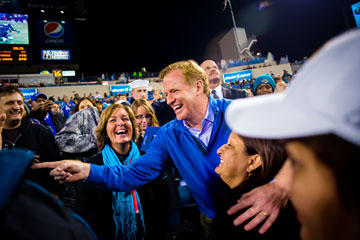
Goodell mingles with fans in Jacksonville, Fla. The Senator's son has a politician's touch
(8 of 9)
The rule changes won't do much for damaged former players (or dead ones and their widows). To them, Goodell's reforms are a painful reminder that the NFL could have taken such precautions years ago and maybe saved them from the memory loss, depression and other ailments they suffer today. "Some of it is defensive," says Mary Ann Easterling, widow of former Atlanta Falcons safety Ray Easterling, who committed suicide in April and was diagnosed with CTE in a postmortem. "They have to put on a show for that. The pressure is on, so then we have all these different ways to not just treat players like commodities."
Goodell argues that the NFL is doing right by these injured players. The last collective-bargaining agreement, for instance, includes $1 billion set aside for retired players. "How many industries do that?" he asks. "Go back to people that are no longer involved in the business? I salute the owners and salute the players for doing that--$620 million of that was in pension benefits alone. So those are very, very significant improvements. We'll try to do more. Can I solve the problems for everybody? I don't think that's possible."
Goodell's unflinching decisions, particularly with regard to fines and the bounty suspensions, have upset a fair number of current players. Minnesota Vikings punter Chris Kluwe, one of the league's more outspoken, honest and thoughtful players, says of the bounty situation, "That was definitely an abuse of power." Critics like Kluwe and union chief Smith argue that Goodell arbitrarily handed down penalties to the Saints players. Goodell has now recused himself from the appeals of the Bountygate players; Tagliabue, the former commissioner, took his place and has heard their arguments. Goodell, as is his nature, stands firm. "I hear from players all the time. They don't want to be targeted," he says. "No one wants to play a game where that exists. On any level. So I don't make any apologies for taking a strong position on this."
The Future of Football
Whether or not fans or players like it, Goodell is talking about making more big changes, all the way down to the youth level. "I pledge that the NFL will do everything in its power to minimize the risks and maximize the rewards of this great and increasingly global game," Goodell said in a sweeping November speech at Harvard's School of Public Health about the future of football.
Goodell is bothered that in September, five kids in Massachusetts suffered concussions in one game. One of Goodell's most trusted safety gurus, Hall of Fame coach and analyst John Madden, supports a proposal to protect young brains that Cantu made in his new book, Concussions and Our Kids: ban tackle football before the age of 14. Goodell isn't onboard with this proposal, since it would deny kids the kind of thrill he experienced.
